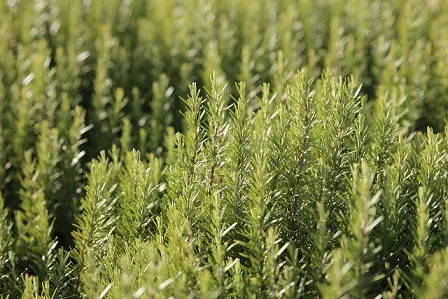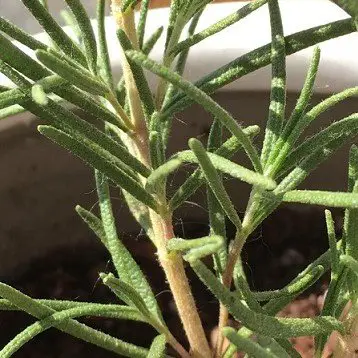Rosemary is a fragrant, perennial, evergreen shrub that is native to the dry rock areas of the Mediterranean. But it can sometimes get infested by spider mites.
Spider mites are too small to notice and that is the reason the infestations often are built up obscure before even the plants get damaged.
You can remove spider mites on Rosemary in many ways like maintaining proper plant hygiene, spraying natural and organic insecticides, using biological predators, companion planting, using natural chemicals, using diatomaceous earth, etc.
Let us look into some of the possible solutions so that you don’t have to go for a hit-and-miss approach.
1. Practice Systematic Hygiene
This approach is relatively easy.
Inspect
Regular plant inspection is necessary. It will keep a check on the situation before it becomes unmanageable. Always inspect plants before buying and before planting.
You can use the magnifying lens to do this. If you find spider webs under and between leaves, you know you have spider mites.
Clean
Dust down the plants regularly with a drizzling water spray. Clean all the plant surfaces with a soft cloth or a sponge.
You can do this by dipping the cloth or sponge with a liquid mixture of water and dishwashing liquid. Repeat this once in 2 days for better results.
Fertilize
Make sure plants are well-fertilized.
Remember healthy plants withstand pests and diseases while weak ones are vulnerable and get easily infected.
Prune
Prune the plants frequently. This will definitely help in keeping a check regularly.
Check how to prune Rosemary – here
Isolate/Quarantine
Isolate the heavily diseased plants from the garden. You should either burn or deeply sanitize them to arrest spider mites from spreading.
Wipe and vacuum
You can wipe the leaves off and on with a leaf shine. Savvy gardeners even recommend neem oil for this. Some gardeners use wet vacuums as a strategy and have been successful.
Shade
Give your plants shade whenever possible. Though plants require sunlight, keep them in shade at least during the hottest times.
This is necessary to maintain a humid environment which helps in keeping mites away.
Control
It is very crucial to manage weeds as they will provide hiding places for the mites.
2. Water Usage
Spider mites dislike moisture.
Maintain your rosemary plants moist to keep them away from these mites.
Shower your rosemary thoroughly, particularly the undersides of the leaves.
Regular watering is very vital as plants that lack water becomes dry and are susceptible to mite attacks.
3. Companion Planting
An easy way to repel spider mites would be to select those plants as companions that these mites hate. This method works best in gardens and farms.
Spider mites hate vegetables like lettuce, garlic, chili pepper, and some ornamentals. You can even swear by chives, onion, etc.
When it comes to Rosemary, Chives are a good companion plant to help avoid pests.

4. Biological method – Usage of predators
Natural predators such as lacewings, thrips, lady wings, etc keep spider mite commune under control.
You can leak these natural predators on your rosemary plants. These predators can eat hundreds of mites a day. Once they are done, they will fly off elsewhere for their feed.
Once you set these predatory mites in the garden, they can reproduce and support you with biological control for a prolonged period.
There won’t be a need for you to add any more agents.
5. Usage of natural chemicals
We can control spider mites by using natural oil extracts. Spider mites hate these oils.
Rosemary oil itself is effective to control spider mites.
Not only the extracts of rosemary are insect resistant in nature but also attack the nervous system of the mites. A mixture of 1 tbsp of rosemary oil along with 1 liter of water will help.
Rosemary oil is non-toxic for pets and humans but can be fatal for pests, especially mites.
Other such oils are:
- Peppermint oil
- Cinnamon oil
- Lemongrass oil
- Caraway oil
- Marjoram oil
- Thyme oil
Sources even say that crown and lemon drop peppers deter mites.
To try this, just fill a spray bottle with water and add a few drops of any of the selected oils and apply it to the affected leaves.
6. Usage of extracts
Extracts of hot peppers, jalapenos, chile, etc can be used. These are proved for their virulence against spider mites.
7. Usage of insecticidal soap or oil
Avoid using pesticides as much as possible as they can kill advantageous insects too. Go for natural pesticides to evacuate the mites.
Dry the plants completely before using any insecticidal soap. Spray either in the early morning or in the evening.
One more procedure is to use soap or oil made from plants such as cottonseed, garlic, clove, etc.
Insecticidal soaps have fatty acids. These acids paralyze and kill the mites.
Horticultural oil too will be of help. This contains mineral oil and aids in getting rid of mites, adult pests, and their eggs.
Neem Oil Spray
Neem oil is considered one of the most effective methods to get away with mites as it is known for its pesticide qualities.
The oil is made from cold-pressed seeds. It has a strong garlicky odor. The active ingredient in this oil is azadirachtin and it is an exceptional insect repellent as well as a growth regulator.
Neem oil chokes them. Using these does not harm your environment too. Moreover, when neem oil is sprayed, the roots of the plant absorb them.
Whenever a new pest tries to attack, they will only end up getting a mouthful of lethal neem. Neem oil can be mixed with castile soap and water and sprayed. This is very effective.
Recommended Neem oil – https://amzn.to/3CcjMhR
Apple cider vinegar spray
Apple cider vinegar is yet another effective option. It is highly acidic in nature which pests hate. Spray the mixture on the affected spots.
A mixture of 3 tbsp vinegar, 1 tbsp baking soda, and a drop of liquid dish soap in 1 ltr of lukewarm water can be sprayed on the affected spots.
Eucalyptus oil spray
Eucalyptus oil is another excellent alternative. It works as a natural insect repellent.
Some more miticides
Pyrethrum – This is a natural pesticide. This is made from a plant closely related to chrysanthemum. This is a good one to start with.
Cinnamite – This is a non-perilous pesticide extracted from cinnamon oil. Though it is effective in invading the pests, the drawback is that it won’t kill the eggs.
Herbal tea – Homemade herbal tea is another miticide. This can be made with ground cinnamon powder, cloves, and water.
Organic salts
Fatty or potash salts can be harsh on mites. This should be applied only in the late afternoon to give maximum time for the moisture to remain on the plants.
These ideas work well, particularly for indoor plants.
Usage of diatomaceous earth
Diatomaceous earth is made of fossils from aquatic organisms. This is an organic pesticide that can be sprinkled on the infected areas of the plants. This will dehydrate the mites and kill them.
Usage of chemical controls
For serious infestation, go for organic insecticides. Testing with a small amount first is advisable. This can be sprayed twice a week.
Though 100% potency won’t be there, it will kill the mites on the plant. Again, eggs would be a problem.
8. Some more solutions
Buttermilk mixture
Gardeners use a mixture of buttermilk, flour, and water and spray them on the leaves once a week. This is efficient of course.
Rubbing alcohol
Dip cotton balls in rubbing alcohol and clean the underside of the leaves. Rinse the leaves intensively after a few hours.
Cold water
Cold water will play wonders in destroying spider mites as they don’t like being cold. So, give a hard good spray at frequent intervals to squash them.
Cayenne pepper mixture
Blend either 1 tsp of cayenne pepper or hot Chile pepper in one cup of water. Spray this solution to control mites.
Garlic spray
Crush two garlic cloves in one liter of water and allow it to settle overnight. Spray the solution for good results.
Time taken to chuck spider mites
It completely depends on the severity of the infection and the control method adopted.
Presumably, a few weeks to snuff out the mites.
If you pick sprays, apply them weekly till you get the desired result.
If you pick predators, results are expected sooner compared to sprays. The predators gulp down hundreds of mites a day.
How do Spider Mites spread?
Spider mites are more common in dry regions. They are wind-friendly and spread very widely. Disposal of infected plants is really important to contain them.
They use these below techniques to spread around.
Anchoring
They use a few strands of silk to secure them to the ground.
Wind-testing
They raise one arm to check the wind.
Soil lofting
Then they release tiny silk strands to help sail.
Anchors away
When the wind blows strongly, they release their anchors.
How to detect Spider Mites?
Here are a few signs that can suggest you might have a spider mites infestation.
- Light dots on the leaves.
- Leaves turning yellow.
- Dull appearance.
- Shake the leaves on white paper.
- Web in between the leaves is a sure sign.
Impact of spider mites on plants
These normally live under the leaves, get fed by leaf tissues, and by sucking plant fluids.
These mites can be wreckage to your garden. They suck chlorophyll, water, and all the nutrients from leaves.
This directly affects the growth of the plants.
Final words
Regular plant hygiene and careful maintenance are all you need to do to keep your garden evergreen.

